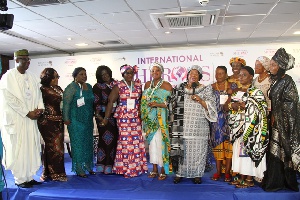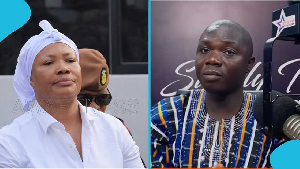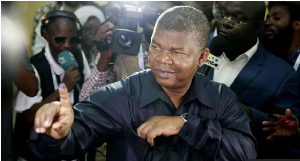The immediate past President of Malawi, Her Excellency Dr Joyce Banda, has called for positive steps to enhance the inclusion of more women in the political administration of African countries.
She said women were able to work effectively at any role given them because they were good leaders and were able to bring drastic transformation in their areas of operation.
“Women are good leaders, women take risks, feel the urgency of doing something about situations, and they focus on big projects and small projects. Women leaders usually have an inclusion team- building style,” she said.
She made the call at the International Sheroes Forum 2015, which is a global gathering of women leaders, in Accra on Thursday, October 8.
The forum was aimed at strengthening and influencing women in business, government, academia and society in general, and provided participants with the opportunity to explore how successful women leaders were redefining pathways to power—in business, politics and in our communities.
The theme for the event, organised by Forum Solutions Limited, an international forum and events management company based in Accra, was: ‘Redefining the Rules of Engagement for Gender Equality.’
Dr Banda further stated that women empowerment would bring about the needed change yearned for in Africa, because they had their various countries at heart and would place their nations above their personal interest.
Citing herself as an example, she said she had been able to sponsor over 2000 girls to further their education and pushed for a bill on domestic violence against women into law as a Minister of Gender in her country.
Narrating her experience as former president, she said: “When I came in, the economy had grown from 1.8 per cent to 6.3 per cent, at the time I was leaving. When I came in, factories were operating at four per cent. When I left factories were operating for 85 per cent.”
Dr Banda, also a former Member of Parliament, said on the average, only one in five women were Members of Parliament, globally while those who had joined the labour force were left behind when it came to equal pay for equal work and equal opportunity.
“Women must be sitting where the laws are made, we must change the laws that negatively affect women and children. If we have many women in parliament we would change these laws without any problem.”
For her part, a former First Lady of Ghana, Nana Konadu Agyemang Rawlings, advocated a more dynamic approach to the fight for gender equality in Africa.
She also called on gender activists to redefine the terms of engagement that would guarantee gender equality now, adding that they must create a world where issues of gender inequality would be a thing of the past.
“We need a new model in our struggle for gender balance. We need an approach that will ensure sustainability of our efforts today,” she said.
Dr Banda also helped to launch “Elect Her In Africa” (EHIA), an organization dedicated to encouraging women to run for elected offices in Africa and also to encourage governments to appoint women to various positions.
Business News of Tuesday, 20 October 2015
Source: Nii Amarh Amarteifio
We need a new model in our struggle for gender balance - Dr Joyce Banda
Opinions












